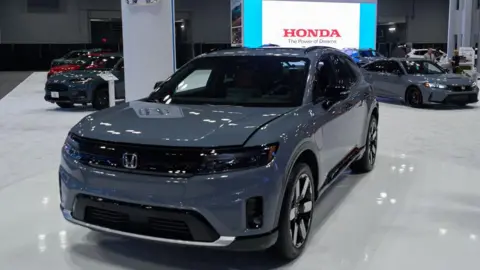Honda-Nissan multi-billion dollar merger collapses
 Getty Images
Getty ImagesMerger talks between Honda and Nissan have collapsed after the firms failed to agree on a multi-billion-dollar tie-up.
The Japanese carmakers, along with junior partner Mitsubishi, had aimed to combine their businesses to fight back against competition from rival firms, especially in China.
The merger would have created an auto group worth $60bn (£48bn), and the world's fourth-largest by vehicle sales after Toyota, Volkswagen and Hyundai.
The companies said they would continue their partnership on electric vehicles.
Karl Brauer, an analyst from online research platform iSeeCars.com, said the failure of the merger was not a total surprise.
"Plenty of automotive mergers have not worked out, and this one had as much potential for disaster as it did to help both brands," he added.
The planned tie-up was seen as providing Nissan, which for a while was Japan's second-largest car company, with crucial relief following years of slowing sales and turmoil involving its top executives.
Honda entered negotiations in a leading position. It remains a popular brand globally, producing and selling more cars than Nissan.
Nissan, meanwhile, has struggled to recover from a leadership crisis since the arrest of former chief executive and chairman Carlos Ghosn in late 2018.
Mr Ghosn was dismissed from his post over allegations of financial misconduct, which he denies, and has lived as a fugitive in his home country of Lebanon after being smuggled out of Japan in a music equipment box.
Nissan announced cost-cutting measures last year, including shedding 9,000 jobs globally, and halving its current chief executive's pay.
Honda's boss Toshihiro Mibe had said any merger would be "based on the assumption that Nissan completes its turnaround action".
The companies eventually disagreed on what role Nissan would play in the merger - equal partner or subsidiary.
Jesper Koll, from Japanese online trading platform operator Monex Group, said the "pressure to make it appear like a merger of equals in Japan is very strong".
"Having somebody leading this would seem almost offensive to the other party."
Mr Koll also said Honda could have come off worse, adding: "You're taking a potentially great company and taxing it with having to bail out an ugly duckling."
Both Nissan and Honda are also facing the prospect of tariffs in the United States, another major market.
The growing electric car market has been increasingly dominated by Chinese manufacturers, such as BYD.
This increased competition has left many of the world's leading carmakers struggling to compete.
In March last year, months before they announced the merger plans, Nissan and Honda had agreed to explore a strategic partnership for electric vehicles.
"The talks started because we believe that we must build up capabilities to fight them, including the current emerging forces, by 2030," Honda's chief executive Toshihiro Mibe said, in reference to the Chinese competition. "Otherwise we will be beaten."
What comes next?
Without the possibility of a Honda merger to ease its troubles, Nissan continues to face an uncertain road ahead.
A possible powerful investor has already emerged, however, with Taiwan's Foxconn, which produces most of the world's advanced computer chips, saying it will consider buying Nissan shares for "co-operation".
Foxconn chairman Young Liu said the firm was interested in collaborating with Renault, the French car giant that has a 36% stake in Nissan after rescuing it from the brink of bankruptcy in 1999.
Renault chimed in on the Honda-Nissan fallout on Thursday, calling the terms of the proposed deal "unacceptable".
Any future deal for Nissan, according to the analyst Karl Brauer, will need to rely on leadership "that can identify and execute synergies across both companies, as well as manage the political and cultural challenges".